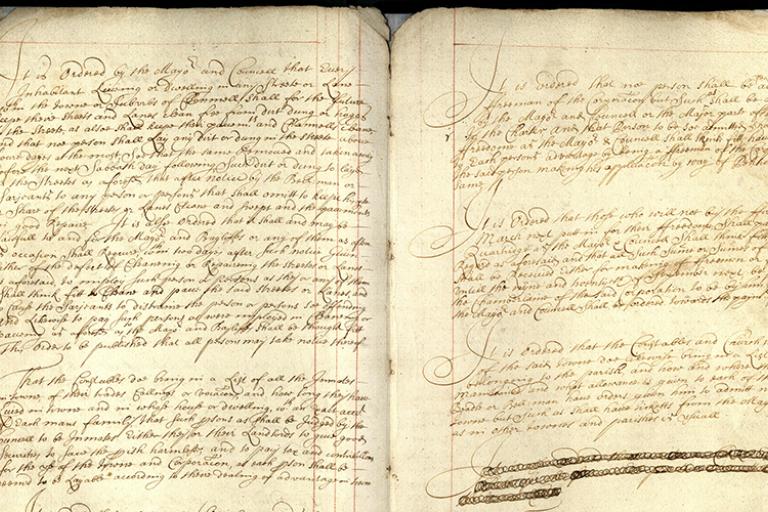Tipperary County Archives holds the minute books of Clonmel Town Council from 1687. They are a unique and intriguing record of both the time and the place. The Corporation of Clonmel in the modern sense came into being with the governing charter of James I in 1608 and the minute books of this jurisdiction record the town’s administrative history.

For example they record:
- elections of Mayors, Councillors and Bailiffs;
- appointments and resignations to positions and committees;
- quarterly meetings attendances,
- freemen of the area;
- details of oaths of allegiance;
- declarations on appointments as auditor and assessor;
- a wide variety of resolutions as well as issues relating to the day to day functioning of the town - for example issues of Trespass, details of Boundaries and Common Areas, Markets and Commerce, and Roads.
The first minute book of this collection covers the period 1687 – 1718, a very interesting one in Clonmel’s history:
- The town is growing and expanding, permissions are being granted to make doors in the town walls (25th May 1694); bridges and roads are being built (road to be built to the ‘Spaw well at the foot of the mountains’, 2nd August 1693).
- The Commons of Clonmel are set (5th February 1693) and leases & liberties on the commonage are referenced (22nd January 1699),
- Clonmel is emerging as a commercial centre – ‘constables’ are required to list ‘trades callings or vocations’ of the town’s ‘Inmates’ and ‘Tax and Contributions’ will be paid ‘according to theire dealing of advantage in town’ (8th February 1687); properties need to be kept ‘free of dung & dirt’ and Fair Days occur regularly (24th & 25th August 1696)
- On 1st November 1695 there is an entry noting that Papists and Quakers are allowed to trade in the town, though restrictions on Catholics are referenced, for example the entry on 16th March 1696 which outlines that all papist houses are to have soldiers ‘quartered upon them for preventing cabals & meetings’.
By the 1690s in Ireland, as a result of Cromwellian settlement, British Protestants controlled three quarters of all lands and almost all of the houses in the walled towns of Ireland. This was the case too in Clonmel, where urban dominance by Protestant settlers enabled various categories of merchants to progress to the ranks of the landed gentry.
Clonmel was particularly noteworthy in the raising of entrepreneurial families to landed gentry. Families such as Carleton, Hammerton, Kellet and Perry progressed to ownership of landed estates in the period from the last quarter of the 17th century to the turn of the 18th century.
But the most successful of all was Richard Moore, who came to Clonmel around 1655 and who by the time of his death was in possession of extensive estates in Tipperary. This minute book, until recently in the hands of Moore’s descendants since around 1711, provides a unique view into this world, into how this urban dominance gave control of the town and surrounding areas to the emerging Protestant gentry.
By the late 17th century, electoral franchise and selection for positions in Irish local government were directly linked with loyalty to the crown. The Corporation of Clonmel was very keen to emphasise its loyalty to the reigning monarchs, William and Mary (1689-1702) and Queen Anne (1702-1714). For example, the minutes for 3rd April 1695 record the Corporation considering ‘with horror & detestation… the most execrable & Horrid Plott for the assassination of your Ma[jes]ties royall p[er]son’. The minutes of 15th September 1709 record the Corporation ‘rejoyceing for the greate & glorious victory lately obtained by her ma[jes]ties & her Allies Armes over the French’ in Flanders.
The minute book has been beautifully conserved by the fantastic conservators at Mucros Bookbindery (Paul and Sharon), to whom we are extremely grateful.
Our many thanks too to Creative Ireland who financed the digitisation of the book which allows us to share it with you.
We plan to prepare transcriptions of the minute book over the next number of months, for publication on this website. In the meantime, we hope you enjoy browsing through this first hand record of part of Clonmel’s history, and look forward to receiving any feedback you might have: (Rachel.granville@tipperarycoco.ie)
| Attachment | Size |
|---|---|
| 73.54 MB | |
| 73.46 MB | |
| 50.25 MB |


